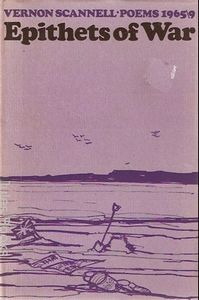Reilly 291.
Vernon Scannell (23 January 1922 – 16 November 2007) was a British poet and author. He was at one time a professional boxer, and wrote novels about the sport.
After some miscellaneous jobs and some early sexual adventures, amusingly described in his autobiographical volume, Drums of Morning, he joined the Army in 1940, and served in the Middle East and Normandy in the 51st Highland Division. The horrors of war had a profound effect on him, and appear either overtly or as an undertone in a great deal of his writing. He deserted once in Tunisia after seeing the consequences of a massacre, and was sent to prison in Alexandria. Released on a suspended sentence, he took part in the Normandy landings, where he was wounded on patrol.
While he was convalescing, with the war over, he deserted again, and it was now that he adopted the name Scannell. He went to live with his sister in London, and more miscellaneous jobs followed, including working in a dolls' heads factory, and boxing. He discovered London pubs, and friendly women in them. But he was determined now to become a writer and, above all, a poet.
However, his desertion caught up with him. He was arrested and went before a court martial, where he said that after five years in the Army he had to escape it or see the final extinction of his humanity. However, it was when he said that he was a poet that the judges looked worried. He was remanded for a psychiatrist's report and instead of being sent to prison was delivered to a mental hospital. Here a young captain told him, “This is the last place to get well”, and had him discharged within a few weeks. He left in a state of wild exhilaration, and at the same time full of guilt at the thought of his soldier colleagues who were now in prison for desertion, or had died in a war that he had survived.
Vernon Scannell was a gifted poet, and also a vigorous champion of poetry, who left school at 14 and largely educated himself. He was already becoming well known as a poet by his mid-twenties. From the age of 40 he lived entirely by his writing and broadcasting, and he was still writing strong and effective poetry almost up to his death.
